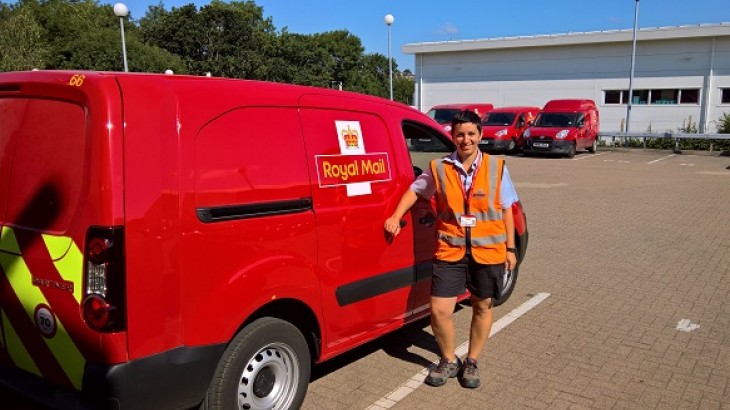Vote 100

We’ve had an amazing response to our Vote 100 campaign so far so please keep your nominations coming in. Over the next few months we will continue to profile 100 female colleagues who embody our values and demonstrate how Royal Mail Group can be a fantastic place for women to excel.
This week we profile postwoman, Rabea Saunders from Ryde delivery office.
Ryde delivery line manager Ian Shorter, said: ‘Nothing is too difficult for Rabea and nothing is too much to ask.‘If there is a duty uncovered she will tell me about it and do all she can to help. She is always polite, friendly and patient and she always knows what to say to get the best out of people. Customers have phoned in to praise her and tell me what a lovely postwoman they have on their street.’
Ryde delivery office manager Peter Villa, said: ‘Rabea has certainly impressed me with her positive attitude, her attention to detail, and the support she has provided to both me and her colleagues - nothing is too much trouble for her. She has the most fantastic and moving back story of survival following the break-up of the former Yugoslavia.’
Rabea joined Royal Mail in 2015. She was born in Kosovo and is one of 10 sisters in her family. ‘Growing up in Kosovo was very challenging,’ she said. ‘In 1989 Slobodan Milosevic became the president of Serbia and shortly after, stripped Kosovo of its autonomy. Throughout the 1990s many people fled Kosovo in search of a better life in Europe. Families were forced to live separately as the men went to work abroad to support their families, while others worked hard at home and barely survived.
‘There were constant food shortages, which meant we had to grow everything we could in our allotment. We had to grow up much faster than most children in the western world. Primary schools were allowed to run as normal, but the teachers didn't get paid, and there were no supplies provided, so we had to buy everything ourselves from books and notebooks, to colouring pens, pads and pencils. High schools and universities weren't allowed to exist in the Albanian language, so private homes of people who had fled the country became schools.
‘When I think about it, it wasn't much of a school. But however little, we still learned, and very importantly, it gave us a sense of independence. We had to be very careful though because to the Serbian authorities our little schools were illegal and if there were police around we had to jump out of the windows and scarper.
‘When NATO started bombing Serbian army bases in March 1999, we were convinced that Serbia would soon give up and the war would be over. But instead, a week later, Serbian forces began going from house to house kicking everybody out on to the streets. Within minutes, we were in a big convoy of people being pushed towards the train station and by midnight we were on a train packed like sardines on our way to a field between the Kosovan and Macedonian borders.
‘As Macedonia wasn't ready to accept all the people being sent their way we had to spend a very rainy week living in that field before we were put on a bus to Albania. There we received help from the Albanian people and celebrated the fact that we were no longer in danger of being killed or dying from hunger.
‘Three months later, Milosevic surrendered and NATO troops began moving in and building camps. I was lucky enough to get a job as a cleaner with a British company that was contracted to maintain British Army camps. I was even luckier when on the third day in my new job I was made a supervisor after my boss discovered that I was able to speak English as a result of watching so many Hollywood films!
‘For the next two years I worked as a laundry supervisor and part-time translator between the Army, my English colleagues and the other locals who worked in the camp. My English and my knowledge of Great Britain quickly improved and pretty soon, I was learning all about fish and chips and tea with milk – something that was unheard of in my country!
‘In 2002 I was given a scholarship to study in the United States and by 2006 I had earned my Bachelor’s degree in modern foreign languages. Then, in 2007, I moved to the Isle of Wight where I now live with my husband, our two daughters, and dog Alfie.
‘I feel very honoured to have been recognised in the Vote 100 campaign and I am proud to be part of the team I work with. Working for Royal Mail is a real privilege.’
Vote 100
[]
Our Vote 100 campaign is your chance to help us showcase the enormous contribution our women make each and every day both to colleagues and customers, ensuring we remain the UK’s most trusted postal operator.
If there is someone in your workplace who you admire for their outstanding work ethic, their drive to improve their own and others’ skills, their knack for supporting or mentoring others, showing kindness, overcoming obstacles, or influencing positive behaviour – we want to hear from you!
Please send your name and contact details plus the name of the colleague you wish to nominate to either vote100@royalmail.com or Freepost VOTE 100. We will then be in touch to obtain further details.



